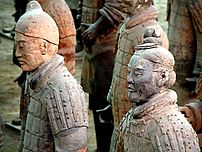 Zhang Lijia
Zhang LijiaOur best-seller author
Zhang Lijia is going to tour Australia to promote her book "Socialism is Great!" and is treating the domestic media with some great interviews.
After ten years on the Chinese factory floor and a study in Great Britain, Zhang saw back in China the start of her media career, she tells the Syndney Morning Herald:
Since her days in the factory, however, Zhang had harboured ambitions to write. "I got my first breakthrough with
Newsweek in May 1996. I wrote about a socialist model village, Dazhai, and how it had become commercialised. Shortly after I became pregnant with my first child I gave up the full-time ABC job [in September 1996] and decided to pursue my own freelance writing. Looking back, that's probably the best decision I ever made." Her journalism has since appeared in
The Sydney Morning Herald,
The Independent and
South China Morning Post among other publications.
In December 2000, she wrote a piece for
The Wall Street Journal Asia about her experiences in the missile factory, provoking surprise among many who knew her. "Lots of my friends never knew I'd come from a worker background. They thought I was better educated. They said, 'Why don't you write a book?' I started some research and realised although the market had been flooded by China memoirs, few are set in the 1980s."
Zhang Lijia is a speaker at the
China Speakers Bureau and
we can help you to check her availability for your event. Ms Zhang can cover a wide range of subjects, including the
life of a working mother in China.
 Paul Denlinger
Paul Denlinger

![Reblog this post [with Zemanta]](http://img.zemanta.com/reblog_e.png?x-id=186befb4-f3b0-4fad-b953-97e85c1f5f6c)

![Reblog this post [with Zemanta]](http://img.zemanta.com/reblog_e.png?x-id=1442b16f-2271-46c0-964d-6b662b9e1a7e)

![Reblog this post [with Zemanta]](http://img.zemanta.com/reblog_e.png?x-id=51e929d4-cd12-4374-8384-e72ebbb994ae)




![Reblog this post [with Zemanta]](http://img.zemanta.com/reblog_e.png?x-id=250a6684-0617-4905-bd8c-b36129c91bbc)

![Reblog this post [with Zemanta]](http://img.zemanta.com/reblog_e.png?x-id=56a01849-8de2-43ea-aafc-a3c2596c461f)



![Reblog this post [with Zemanta]](http://img.zemanta.com/reblog_e.png?x-id=74658a6a-7e78-42a5-8970-42c04c8bc773)



![Reblog this post [with Zemanta]](http://img.zemanta.com/reblog_e.png?x-id=7748b4fc-caf1-41d4-a493-ffd5c73ee2bc)


![Reblog this post [with Zemanta]](http://img.zemanta.com/reblog_e.png?x-id=8fe94058-632a-4856-9fc3-8fcc7da8d6cb)

![Reblog this post [with Zemanta]](http://img.zemanta.com/reblog_e.png?x-id=59114e19-640f-4031-88af-551f7765f29f)









